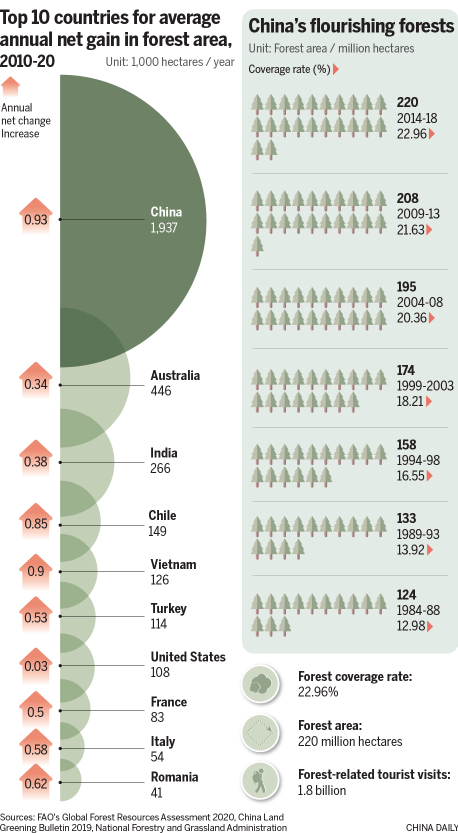Eco-reform aids green initiative





Lumberjack homestays
Heilongjiang's timber output peaked at 15.7 million cubic meters in 1978, but plummeted to 894,000 cubic meters in 2013, before the ban on commercial logging in natural forests was introduced.
The ban was extended nationwide in 2015, and the National Forestry and Grassland Administration said the timber output from major forest farms across China dropped by an annual average of 3.73 million cubic meters in the three years to the end of 2017.
The extension of the ban saw more forest farms roll out aid to employees as they put down their chain saws and picked up other trades.
One such employee was Gu Changyun, from a picturesque logging town in Arxan, Inner Mongolia, which lies to the southwest of the Greater Hinggan Mountains.
Born into a lumberjack family, Gu joined the local forest farm in 1990. As the logging mainly took place in the coldest months-when the soil is frozen solid, making it easier to drag out felled trees-she has chronic rheumatism.
"We would depart in the early hours and return home in darkness," said Gu, 48, a widow whose 26-year-old son is a migrant worker in southwestern China's Sichuan province.
"We would take steamed buns for meals, and put them close to the skin to keep them warm."
In recent years, local authorities developed workshops that make tourism souvenirs using birch bark. Gu was among the 45 impoverished workers to benefit. She joined the project two years ago, and now earns 2,000 yuan a month.
Some of her neighbors became self-taught tour guides after the local government built lumberjack-themed homestays reminiscent of life in the area in the 1950s.
Han Zhongyong, who oversees the project, said it had boosted the construction of roads and water, heating and drainage infrastructure.
To make up for the shortfall in timber output, China launched an initiative in 2018 to increase the number of plantations to boost usable timber reserves.
Six regions have been designated for the development of timber reserve forests, including coastal regions in southeastern China, the middle and lower reaches of the Yangtze River, and the Beijing-Tianjin-Hebei cluster, the National Forestry and Grassland Administration said in a circular issued four years ago.




















